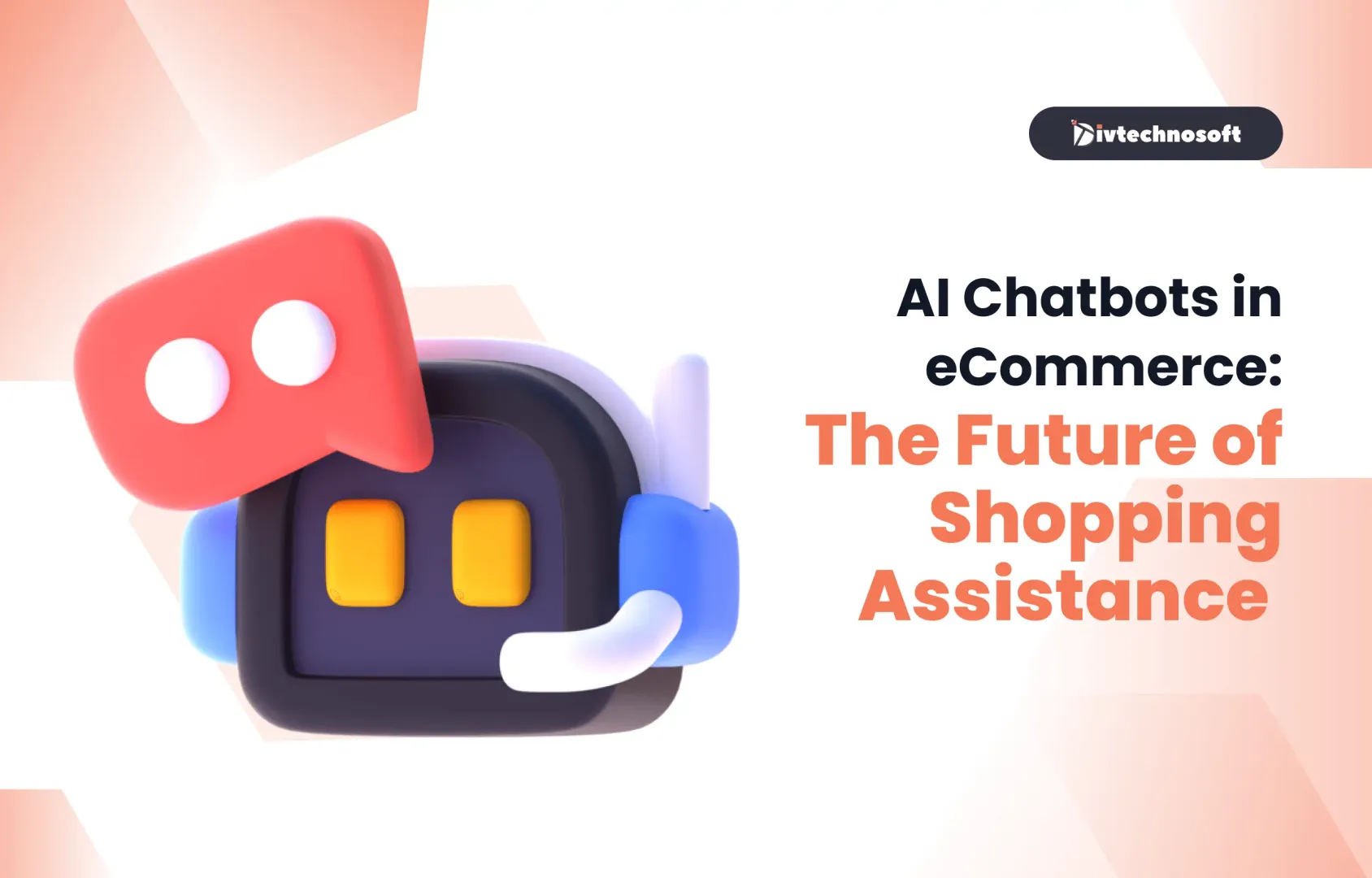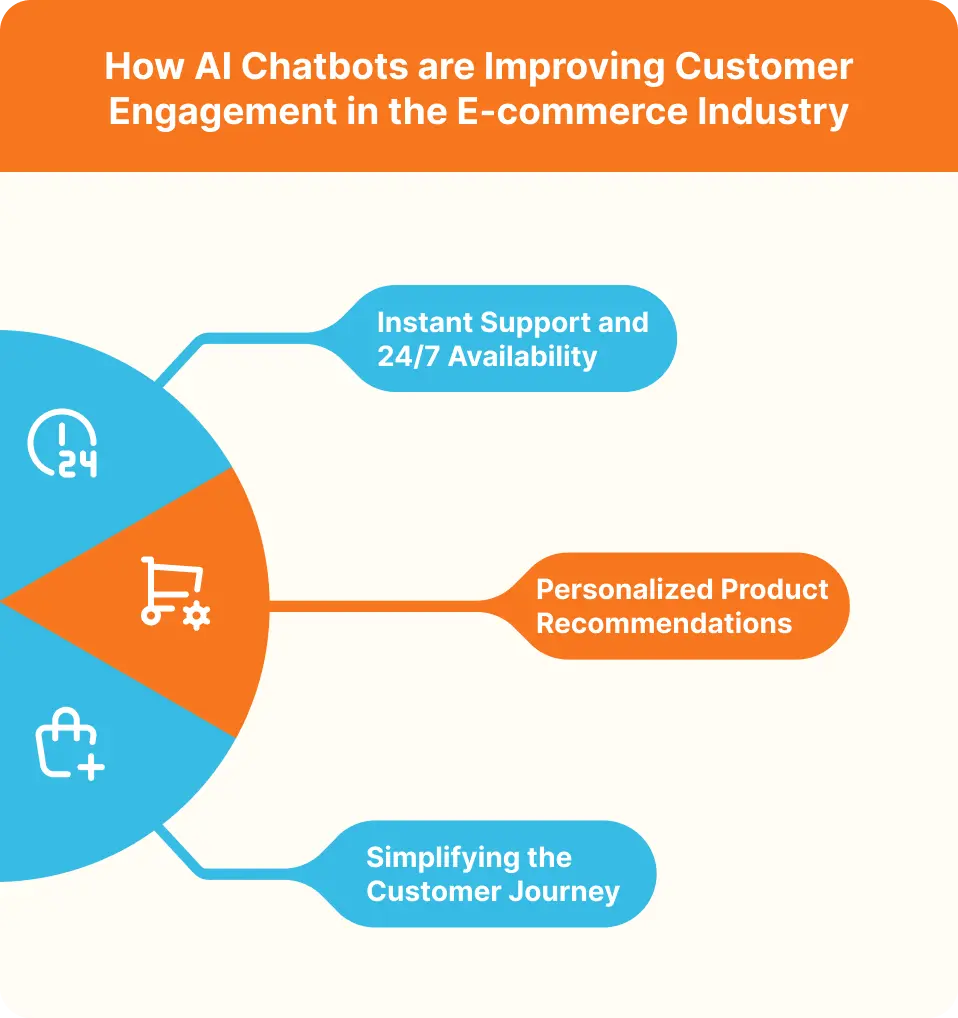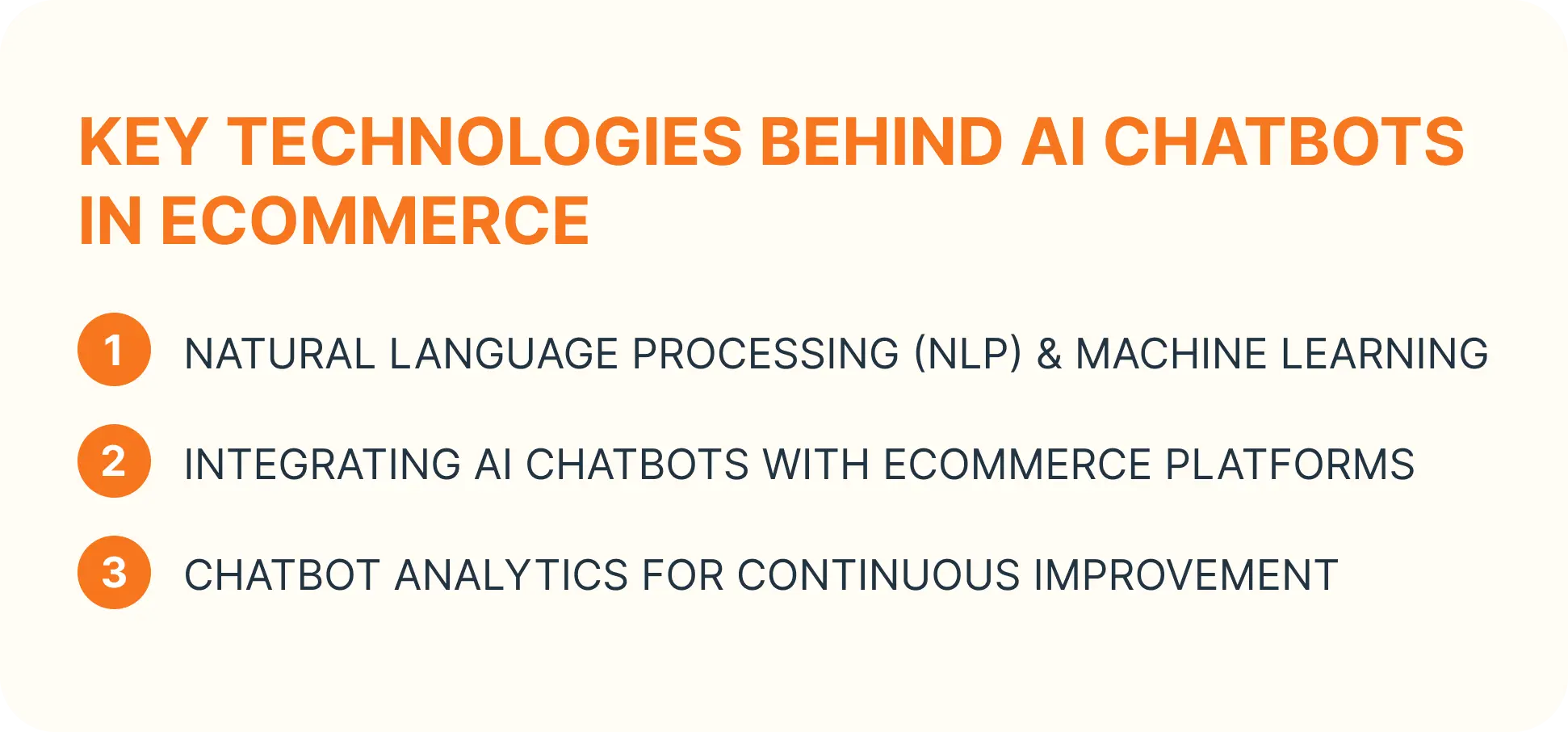AI Chatbots in eCommerce: The Future of Shopping Assistance
Discover how AI chatbots are revolutionizing eCommerce by delivering personalized shopping experiences, 24/7 customer support, and boosting sales. Learn why chatbots are essential for future-ready online businesses.

Have you ever wished you had a personal shopping assistant to help you navigate endless product options and find the perfect item? Thanks to AI technology advancements, that dream is becoming a reality. The world of eCommerce is transforming, with AI chatbots at the core of this revolution.
A recent Statista survey shows that 80% of businesses use or plan to implement AI chatbots in their customer service strategies.
Why? Because AI chatbots are making shopping smarter, faster, and more personalized. From instantly answering customer queries to guiding users through their purchase journey, these chatbots are helping eCommerce businesses streamline their operations and boost conversions. Alongside these AI-driven advancements, Revolutionizing E-Commerce with Mobile App Innovations plays a key role in transforming the eCommerce space.
In this blog, we’ll dive into how AI chatbots in eCommerce are set to redefine the future of online shopping. Whether it’s through offering instant customer support, personalized product recommendations, or improving customer engagement, these chatbots are a game changer. Keep reading to discover how AI is not just enhancing user experiences, but also shaping the future of eCommerce.
Let’s examine why every business needs an AI chatbot to stay competitive in today’s fast-evolving digital marketplace.
How AI Chatbots in eCommerce Enhance Customer Experience
AI chatbots in ecommerce are revolutionizing customer interactions, offering numerous benefits that elevate the shopping experience. Here’s how AI chatbots are improving customer engagement in the ecommerce industry:

1. Instant Support and 24/7 Availability
AI chatbots in ecommerce offer instant, 24/7 support, allowing customers to get answers to their queries instantly without having to wait for office hours.
They provide real-time assistance with tasks such as answering product questions, resolving issues, and guiding users through the checkout process, significantly improving customer satisfaction.
2. Personalized Product Recommendations
AI chatbots personalize the shopping experience by providing customized product recommendations based on customer preferences, browsing history, and past interactions.
This personalized approach enhances the shopping experience and boosts conversion rates, as customers feel their individual needs are understood.
3. Simplifying the Customer Journey
AI chatbots simplify the customer journey by guiding users through purchasing steps, assisting with product searches, and providing payment options.
They remove obstacles and ensure a smoother experience by offering post-purchase support and resolving issues, making the process more efficient from start to finish.
Boosting Conversions and Sales with AI Chatbots
AI chatbots are transforming the ecommerce landscape by significantly improving the customer experience and driving higher conversions. By offering personalized assistance, real-time support, and seamless interaction, chatbots help businesses increase sales and build stronger customer relationships. Here’s how AI chatbots are enhancing eCommerce success:

1. Chatbots as Virtual Shopping Assistants
AI chatbots serve as virtual shopping assistants, guiding customers through the shopping process, helping them find the right products, and answering queries in real-time.
By offering instant support and personalized recommendations, chatbots help customers make confident purchase decisions, ultimately boosting sales and conversion rates.
2. Increasing Customer Engagement and Purchase Rates
AI chatbots boost customer engagement by providing real-time communication and personalized interactions, addressing questions and concerns promptly.
This ongoing support makes customers happier and more likely to complete their purchases, as they have help whenever they need it.
3. Improving Product Recommendations and Additional Purchases Opportunities
AI chatbots can boost sales by recommending related products or higher-end versions of items based on customer data, such as past purchases and browsing habits.
This targeted approach enhances the shopping experience, increases the average order value, and drives higher revenue by offering personalized suggestions that meet customer needs.
The Technology Behind AI Chatbots in eCommerce
AI chatbots in eCommerce are powered by advanced technologies that help them understand customer questions, give relevant answers, and get better over time. These technologies play a crucial role in providing smooth and personalized shopping experiences. Here’s a look at the key technologies behind these smart systems:

1. Natural Language Processing (NLP) & Machine Learning
AI chatbots use NLP to understand customer queries and generate relevant, human-like responses by interpreting text input and identifying customer intent.
Machine learning enables chatbots to improve over time by learning from customer interactions, making them more accurate and efficient at meeting customer needs.
2. Integrating AI Chatbots with eCommerce Platforms
AI chatbots are integrated with eCommerce platforms, allowing them to offer real-time assistance by connecting with product catalogs, payment systems, and inventory tools.
This integration enables chatbots to provide personalized product recommendations, process orders, and offer support, ensuring a seamless and efficient shopping experience for customers.
3. Chatbot Analytics for Continuous Improvement
AI chatbots gather data from customer interactions, helping businesses identify patterns, preferences, and areas for improvement.
By using chatbot analytics, companies can continuously enhance performance, optimize responses, and improve the overall customer experience.
Challenges in Implementing AI Chatbots
Implementing AI chatbots in eCommerce comes with several challenges that need to be addressed to ensure a smooth and effective experience for both businesses and customers. Here are some of the key challenges:

1. Overcoming Customer Doubts and Trust Issues
A major challenge in implementing AI chatbots is overcoming customer doubts, as many people feel uneasy interacting with a bot, particularly for sensitive or complex issues.
Building trust involves ensuring chatbots are transparent, reliable, and capable of offering human-like interactions, along with providing easy access to human support when needed.
2. Data Privacy and Security Concerns
Data privacy and security are major concerns as AI chatbots handle sensitive customer information, requiring compliance with privacy regulations like GDPR and strong security measures.
To build customer trust, businesses must be transparent about how data is used and provide clear privacy policies to ensure customer confidence in the chatbot system.
3. Ensuring Chatbot Accuracy Learning
Ensuring chatbot accuracy is a challenge, as they must understand diverse queries and provide appropriate responses, requiring continuous learning and regular updates.
Chatbots should be able to hand over complicated issues to human agents when necessary, ensuring customers always get the best support.

The Future of AI Chatbots in eCommerce
As AI chatbots continue to evolve, their role in eCommerce will become even more impactful. Here’s an overview of the future of AI chatbots and how businesses can prepare for upcoming changes:
1. Emerging Trends and Innovations
The future of AI chatbots will include a better understanding of customer emotions, as they will be able to analyze both text and the tone of conversations.
AI chatbots will become more like humans, with features like voice commands, making interactions smoother and easier for customers.
2. Predictions for the Next 5-10 Years
In the next 5-10 years, AI chatbots will handle more complex tasks and predict customer needs, offering personalized recommendations before they are even asked.
AI chatbots will integrate with augmented reality (AR) and virtual reality (VR) to provide interactive shopping experiences, such as virtual product try-ons while becoming smarter and more accurate over time.
3. How Businesses Can Prepare for the Future
Businesses should start integrating advanced AI technologies into their chatbots, focusing on improving accuracy, and customer personalization, and ensuring robust data security as AI continues to process more data.
Companies should prioritize seamless multi-channel integration, allowing chatbots to provide consistent support across platforms like websites, social media, and voice assistants while staying updated with AI advancements.
Conclusion
AI chatbots are becoming crucial for eCommerce businesses by providing instant support, personalized experiences, and improving customer satisfaction. They help streamline operations, reduce costs, and drive sales, making them a key tool for staying competitive in the digital marketplace.
As technology improves, AI chatbots will become even more effective, offering increased value to both businesses and customers. With continuous advancements, these chatbots will play an even greater role in transforming the eCommerce experience.






